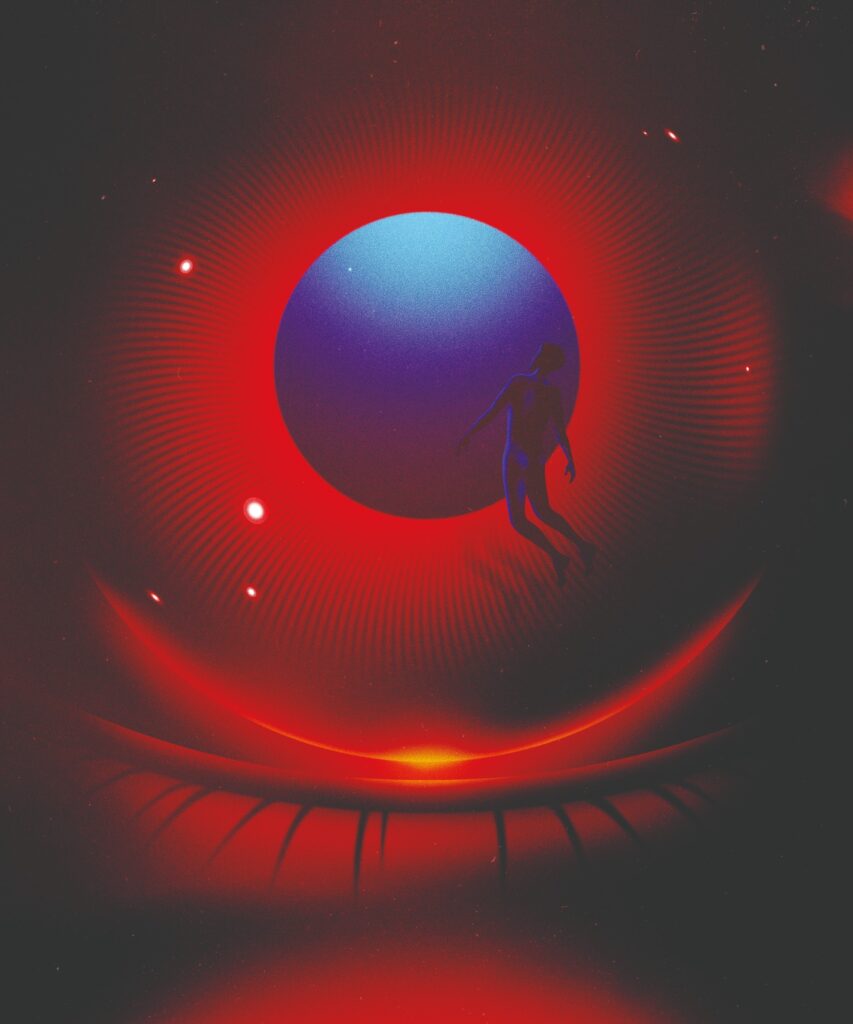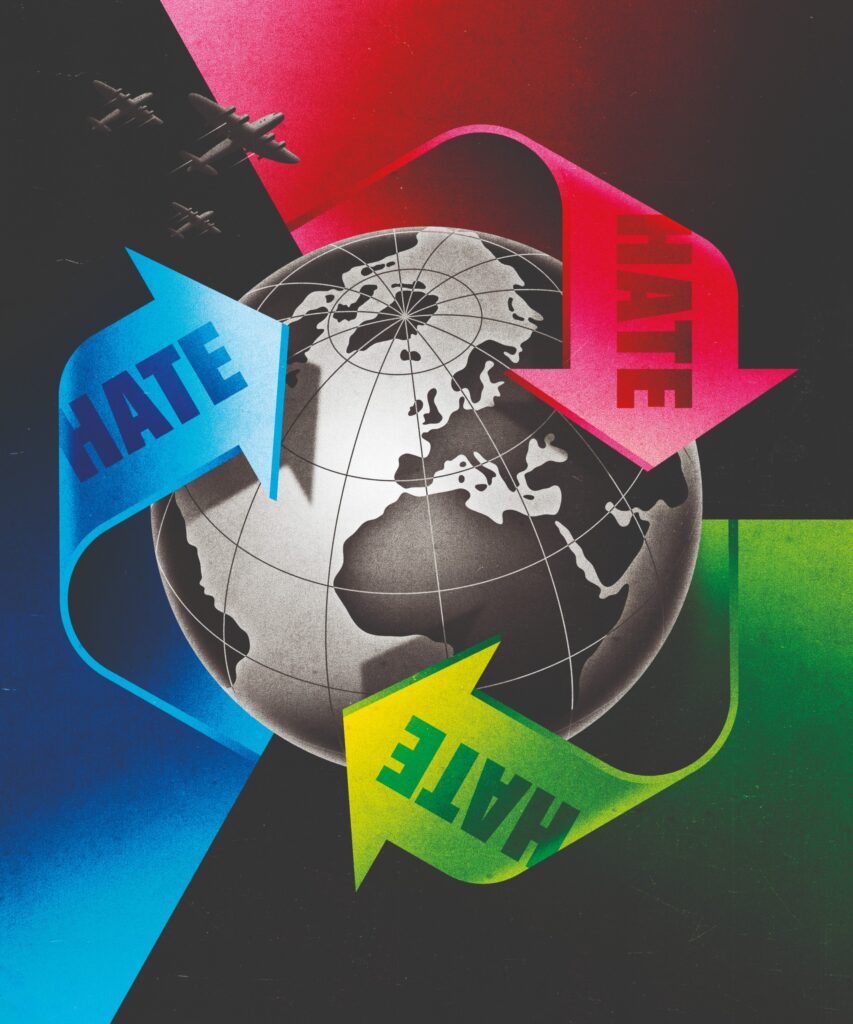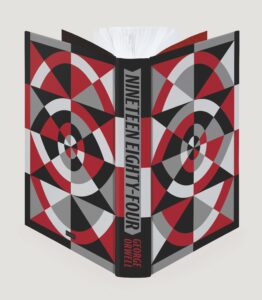
75 Years of 1984: Why George Orwell’s Classic Remains More Relevant Than Ever
Elif Shafak on the Relentless Real-World Spread of Orwellian Dystopia
There is Orwell the human being. There is Orwell the novelist. There is Orwell the intellectual, the critic, the journalist, the essayist, the radical. But lately, George Orwell—who was born Eric Arthur Blair and who never fully abandoned his original name—has increasingly come to be regarded as a modern oracle, a gifted soothsayer who predicted with terrifying accuracy how fragile and fallible our political systems were, how close the shadow of authoritarianism. His body of work has become a compass to help us navigate our way in times of democratic recession and backsliding, as is the case worldwide. Among all his books, the one that has left the deepest impact on generations of readers across borders is, no doubt, Nineteen Eighty-Four.
I was an undergrad in Turkey when I first discovered the cautionary novel—a tattered copy coincidentally picked up in a second-hand bookshop. Winston Smith, a rebel who does not resemble the heroes in lore and legend; a lonely, pensive and observant individual in an oppressive regime. Big Brother, always watching, dominating every inch of daily life, like an unblinking celestial gaze. The rewriting of a nation’s past to suit the orders and needs of the government/the State/the Party. Sands of personal memory trying to survive the crashing waves of collective amnesia.
The world described by Orwell did not seem to be far off. Nor that surreal. It felt eerily familiar and dangerously close.
It all shook me to my core. I found myself thinking about the story long after I had finished the last page. Back in those days, I had quietly started writing fiction, keeping it to myself, dreaming of becoming a novelist—a wisp of a wish I could not even dare to say out loud. This also happened to be a time when I was reading extensively about the systemic human rights violations that had happened and were still happening in my motherland.
Forgotten truths. Unearthed stories. Taboo subjects. Historical chronicles deftly erased by official propaganda. The labelling of anyone who dared to question the dominant narrative as a ‘traitor.’ Sufferings and silences hidden under the veneer of ‘normal life.’ The world described by Orwell did not seem to be far off. Nor that surreal. It felt eerily familiar and dangerously close.
In retrospect, I do not think I was alone in this feeling. Across the world there must have been so many of us who experienced a similarly uncanny sense of déjà vu upon reading Nineteen Eighty-Four for the first time. That is because for those of us who come from “wounded democracies” or autocracies-in-the-making or downright dictatorships, Oceania was never some far-fetched dystopian land set in an unforeseeable future, but something closer, much more visceral. And frightening too. It was not even a prescient warning about where things might lead if politics went unexpectedly wrong. For us, Nineteen Eighty-Four was already here. It was already happening.
*
During the 1990s and early 2000s, a polarized view of the world was very popular and persistent. According to this, the earth was broadly divided into “solid lands” versus “liquid lands.” The former—mostly, advanced Western democracies—were generally thought to be sturdy, safe, steady. Their citizens no longer had to worry about basic human rights and freedoms—such as freedom of speech or women’s rights—because all these had already been achieved, the threshold of social and political development crossed long, long ago.
It was in “other places,” in those storm-tossed, unsettled, liquid countries that such concerns had more justification. After all, those nations were not “there yet”—not yet solidified, they were still becoming, still in flux. But since history meant the story of progress, even those countries that were ‘lagging behind’ would, sooner or later, catch up with the West. The Berlin Wall had come down, the Soviet Union was no more. The only political model that was viable and sustainable in the long run was liberal democracy. Back in those days, there was tremendous confidence, one that was shared by many in both media and academia, that democracy was the shared future of humankind.
 “Always, at every moment, there will be the thrill of victory, the sensation of trampling on an enemy who is helpless. If you want a picture of the future, imagine a boot stamping on a human face—for ever”
“Always, at every moment, there will be the thrill of victory, the sensation of trampling on an enemy who is helpless. If you want a picture of the future, imagine a boot stamping on a human face—for ever”
The World Wide Web emerged against this backdrop, which dovetailed with the excitement surrounding the new digital technologies. What followed was an era of hyper-optimism. Trade and technology would make us all interdependent and interconnected. Thanks to the proliferation of social media platforms—and the growing interaction among nations through the exchange of services, goods and capital—we would all become a global village. A democratic village! From now on, the expansion of democracy would be unstoppable since nothing could stand in the way of the flow of information.
Not even dictators, not even the worst autocrats. Social media networks would spread information far and wide. People would become “informed citizens,” and informed citizens would seek fruitful and constructive solutions. If information travelled freely, openly, how could dictators continue to hide the truth from their own people? The age of authoritarianism was over.
There was such naive trust in social media’s ability to precipitate democratic change and goodness that a young couple in Egypt named their newborn child Facebook, and a family in Israel, a couple of months later, called their third child, Like. By the time those babies were reaching adolescence the world had completely and dramatically changed, the hyper-optimism of the previous decades soured into blatant pessimism.
 “Suddenly he floated out of his seat, dived into the eyes and was swallowed up.”
“Suddenly he floated out of his seat, dived into the eyes and was swallowed up.”
By 2016, it was becoming obvious to most that democracy was not on the rise as predicted, but just the opposite, weakening. The incendiary rhetoric of isolationism, nativist ultranationalism and authoritarianism was echoed in many corners of the world. Surprisingly, this was happening not only in “liquid lands,” but also in “solid lands.” Suddenly the hackneyed binary assumptions of the earlier decades, which were always problematic, were crumbling. Maybe democracy was far more fragile than we had assumed. Maybe we all needed to worry about human rights or freedom of speech or the future of democratic institutions and norms. Maybe there was no such thing as solid lands versus liquid lands, and we were, in truth, all living through “liquid times.”
Even the steady, safe countries of the West were not immune to the dangers of authoritarianism. And as this realization took full hold, the sales of George Orwell’s Nineteen Eighty-Four soared. This rise was especially visible in the USA where the Trump administration brazenly told reporters that there were facts and then there were “alternative facts.” That sounded like something you would encounter in Nineteen Eighty-Four. No wonder then that from cinemas to theaters to Broadway, adaptations of the novel proliferated. Many Americans began to feel what we, in other parts of the world, had felt when we read Nineteen Eighty-Four for the first time—that it was not some farfetched dystopia set in a remote place and time. It was already here. It was already happening.
*
Orwell wrote Nineteen Eighty-Four in a gloomy mood while he was dealing with sickness, deeply worried both for himself and for the state of the world. In particular, he was concerned that objective truth was withering away. The novel is, among many other things, about loss. The loss of truth. The loss of memory. The loss of love and empathy. This is not coincidental. Uncontrolled exercise of power and cruelty is only possible when truth, memory and love/empathy are fully subjugated. It is only then that a human being can be diminished to a “nobody,” an unperson, and the whole society can be reduced down to mere numbers.
When truth fades out on such a massive scale we are catapulted into a hall of distorting mirrors where everything is upside down. The Ministry of Peace engages in the fabrication of war, distrust and hatred. The Ministry of Plenty generates massive inequalities, causing destitution and starvation. The Ministry of Truth manufactures lies. And the primary task of the Ministry of Love is to carry out systemic torture and abuse. In this new order, war is peace, freedom is slavery, and forced-labor camps are labelled as ‘joycamps.’ Distortion of truth can continue so long as citizens do not notice, do not question, do not react—and hence, the following slogan: Ignorance is Strength.
When truth fades out on such a massive scale we are catapulted into a hall of distorting mirrors where everything is upside down.
Nineteen Eighty-Four left a profound impact on countless artists and writers from all backgrounds. Thoughtcrime, memory hole, doublethink, Newspeak… The neologisms that Orwell brilliantly coined have become essential parts of our cultural and literary heritage. In 1974 David Bowie wanted to debut a single titled “Nineteen Eighty-Four,” but it was never fully produced as he could not get permission from Orwell’s wife. Radiohead made a song called “2 + 2 = 5” and Manic Street Preachers released another named “Orwellian.”
In fact, “Orwellian” is the most widely used adjective today that is derived from the name of a writer, poet or thinker—far more than Dickensian, Byronic, Freudian, Kafkaesque or Machiavellian. I sometimes wonder whether it would have made George Orwell uncomfortable or even sad to observe that his name has become a synonym for all the things that he vehemently opposed, or would he understand and accept the pure irony of this?
Ours is the age of mass surveillance, populist authoritarian movements and fragile democracies. Social media platforms have accelerated the erosion of truth and the dissemination of misinformation, slander and hate speech. It was a mistake to regard and romanticize information as a panacea for the world’s problems. For they are completely different things: information, knowledge and wisdom. Every day we are bombarded with thousands of snippets of information, but there is very little knowledge, and no time to slow down to gain knowledge, much less wisdom.
Nineteen Eighty-Four is more relevant than ever before. This remarkable novel stands out not only because of the cautionary tale it tells, but also because it sharply discerns the power of language. Words can heal, words can hurt. They can build or destroy. Since human beings think, remember and process their emotions through words, in order to control both critical thinking and emotional intelligence, language must be policed from above. The official dialect of Oceania is Newspeak. Words that have been eliminated must be instantly forgotten.
 “In one combination or another, these three super-states are permanently at war, and have been so for the past twenty-five years… It is a warfare of limited aims between combatants who are unable to destroy one another.”
“In one combination or another, these three super-states are permanently at war, and have been so for the past twenty-five years… It is a warfare of limited aims between combatants who are unable to destroy one another.”
A totalitarian super-state hates ambiguities, and therefore it will not allow nuances of thought. The philosopher and Holocaust survivor Theodor Adorno once said, “Intolerance of ambiguity is the mark of an authoritarian personality.” In this closed mindset there is no appreciation for diversity or pluralism. No room for uncertainty. Everything must be narrowed down to a rigid binary opposition—us versus them. The definition of ‘them’ might change depending on the whims of the regime but there always has to be an ‘enemy,’ and history must be edited and rewritten to fit the new propaganda. The Party knows that “Who controls the past controls the future: who controls the present controls the past.”
As I am writing this introduction, book bans across US public schools have increased by almost 35 per cent between July 2022 and June 2023. From racial inequality to sexuality to LGBTQ rights, any subject that is regarded as “unwanted” or “inappropriate” can be used as grounds for censorship. There might come a day when we will see Nineteen Eighty-Four being removed from library shelves. To make sure that day never arrives, this powerful and significant novel must be read, re-read and shared across the world. This we owe to George Orwell.
__________________________________

From 1984: 75th Anniversary Edition by George Orwell. Introduction Copyright © 2024 by Elif Shafak. Available from The Folio Society.
Elif Shafak
Elif Shafak is an award-winning British-Turkish novelist and the most widely read female author in Turkey. She has published seventeen books, eleven of which are novels. Her work has been translated into 50 languages. Her latest novel 10 Minutes 38 Seconds in this Strange World was shortlisted for the Booker Prize and RSL Ondaatje Prize, and selected as Blackwell’s Book of the Year. Her previous novel, The Forty Rules of Love was chosen by BBC among 100 Novels that Shaped Our World. Shafak is an honorary fellow at St Anne's College, Oxford University.



















